
Quantum of Solace
A test involving a highly controversial propellantless propulsion system called the quantum drive has failed because the satellite it was aboard fell silent, The Debrief reports.
In a press release, Rogue Space Systems explained that its Barry 1 cubesat, ferried to orbit by a SpaceX Falcon 9 rocket, was plagued with ongoing power-system issues.
A test with the quantum drive, developed by IVO limited, was supposed to demonstrate whether the engine could alter the orbit of the satellite. But for some reason, after over two months in orbit, the test was never initiated, and contact with the satellite was lost on February 9 — an unceremonious end for a demo that was supposedly going to upend the laws of physics.
“Rogue’s Barry-1 satellite didn’t make it all the way through LEOP (Launch and Early Orbit Phase),” IVO founder and President Richard Mansell told The Debrief. “Sadly, we never even got to turn on the Drives!”
Impossible Engine
Had the test actually been conducted, skeptical scientists — and there are many — believed that the quantum drive wouldn’t do anything. That’s because it’s a type of engine known as a “reactionless drive,” in which a reaction mass, essentially the propellant, is not used to generate thrust.
According to Newtonian physics, such a device wouldn’t work because propulsion without a propellant is impossible. Nevertheless, IVO claimed that its quantum drive could generate an eyebrow-raising 52 millinewtons of thrust per one watt of electricity — which is a ludicrous twelve times more efficient than existing ion drives used on satellites, Forbes noted.
It’s an appealing idea. The problem with propellant is that the stuff runs out. It’s also heavy, taking up a significant portion of a spacecraft’s weight, which not only comes with its design limitations but drives up launch costs.
And so there’s been a lot of excitement and controversy over lab tests that claim spacecraft could ditch propellant by harnessing spooky properties of quantum mechanics. But so far, none of them have been borne out in large scale tests, let alone ones conducted in space (of which, according to The Debrief, IVO’s test would have been the first).
Another Crack
Undeterred by the setback — and seemingly the laws of physics — Mansell said that IVO will be conducting further orbital tests with its quantum drive.
“The overall configuration of the Drives will not change,” he told The Debrief. “While waiting for the Barry-1 tests, we have been continuously working to improve the Drives. Those improvements will be part of the next set that goes to space.”
It has to be said: it seems a little convenient that the cubesat went bust before the quantum drives could even be activated after waiting for months in orbit. But hey, maybe they’ll remember to turn the thing on next time and, fingers crossed, even manage to prove physics wrong.
More on space: New Chinese Lander to Start Building Base From Moon Dust Bricks